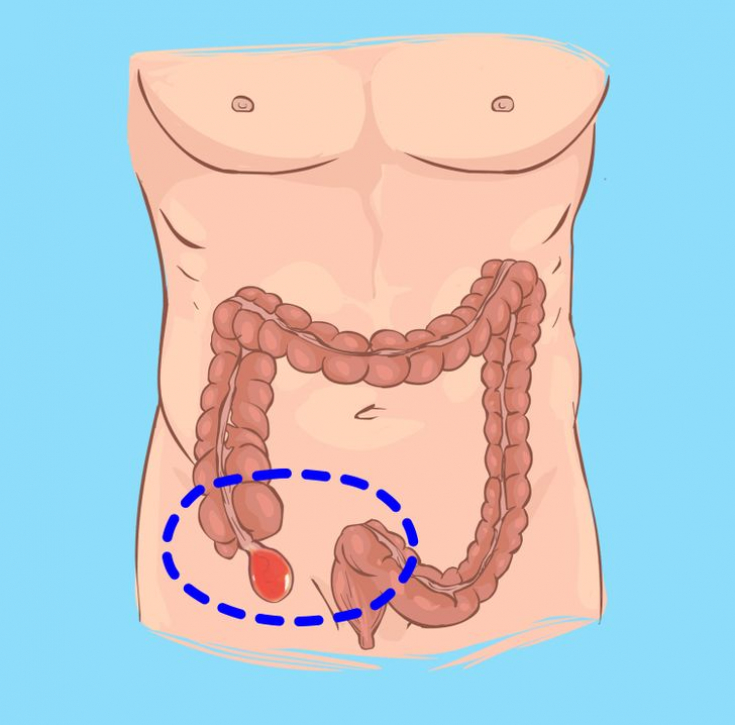Appendicitis – is an inflammation of the appendix – a small process of the caecum (what this process is needed for is still unknown. However, one thing is known - without it a person can live). Location of the appendix – right lower abdomen. Appendicitis can be acute or chronic. Chronic appendicitis – quite a rare occurrence compared to its acute form. Appendicitis most often appears between the ages of 10 and 30.
Appendicitis is a great danger to human life, since untimely diagnosed acute appendicitis is fraught with peritonitis and, as a result, death. That is why every person should be aware of the symptoms of appendicitis in order to seek medical help in a timely manner.
- What is appendicitis and where is it located
- Why does the appendix become inflamed: causes of appendicitis
- Appendicitis Symptoms to Ignore
- What tests are needed: Appendicitis diagnosis
- Are there ways to prevent appendix inflammation
What is appendicitis and where is it located
Appendicitis – is an inflammation of the appendix – a small process of the caecum (what this process is needed for is still unknown. However, one thing is known - without it a person can live). Location of the appendix – right lower abdomen. Appendicitis can be acute or chronic. Chronic appendicitis – quite a rare occurrence compared to its acute form. Appendicitis most often appears between the ages of 10 and 30.

Now that you know where the appendix is located and know that it can become inflamed in any person, let's look at the causes of appendicitis.
Why does the appendix become inflamed: causes of appendicitis & nbsp;
Specialists believe that the cause of inflammation of the appendix is its obturation, which may be complete or partial. It is in the case of complete obstruction that urgent surgery is required.
Often obturation is caused by the accumulation of fecal matter. Other causes of appendix obstruction include:
- enlarged lymphoid follicles;
- parasites;
- injuries;
- tumors.
When the appendix is obstructed, bacteria can multiply in it, which, in fact, leads to inflammation and the formation of pus. It can also compress nearby blood vessels. Insufficient blood flow to the appendix can lead to the development of gangrene. If the appendix ruptures, fecal matter can fill the abdominal cavity, which is also extremely dangerous.

One of the possible complications of appendicitis is peritonitis – inflammation of the tissues lining the abdominal wall. A ruptured appendix can spread infection to other organs, including:
- caecum;
- bladder;
- sigmoid colon.
If the infected appendix does not rupture, the infection is limited to a small area of distribution, however, in this case, an abscess can form, which also poses a danger to humans.
Symptoms of Appendicitis to Ignore
- pain in the lower right side of the abdomen;
- nausea;
- vomit;
- diarrhea;
- constipation;
- loss of appetite;
- gas obstruction;
- abdominal swelling;
- high temperature.
One of the first signs of appendicitis are seizures. They get stronger over time. Changes in stool and, in some cases, urination may also occur with appendicitis.
Pain in the right side, which occurs along with the above symptoms – serious reason to see a doctor. Remember that appendicitis requires urgent medical attention. In the first 24 hours after the onset of symptoms, appendix rupture is quite rare, but after 48 hours, appendix rupture occurs in in 80% of patients.
What examinations do you need to undergo: diagnosis of appendicitis
On physical examination, tenderness in the lower right quadrant of the abdomen is an indicator of appendicitis. Pregnant women experience more pain. If an appendix perforation occurs, the abdomen may be hard and swollen.

In addition to the physical exam, your doctor may also do other tests to check for appendicitis:
- urinalysis;
- gynecological examination;
- pregnancy test (to rule out ectopic pregnancy);
- abdominal imaging: x-ray, ultrasound or CT scan;
- chest x-ray.
Appendicitis treatment
In rare cases, appendicitis is treated without surgery with antibiotics and a liquid diet.
However, in most cases an operation is required, the type of which depends on the characteristics of each particular case.
Are there ways to prevent inflammation of the appendix
Unfortunately, there is no prevention of appendicitis. However, at the lowest risk are people who eat foods rich in fiber, i.e. fresh fruits and vegetables.
Estet-portal, realizing that our person is the last to seek medical help, warns of the danger of appendicitis for life and urges not to ignore the possible symptoms of inflammation of the appendix in any case, so as not to endanger one's life.






Add a comment